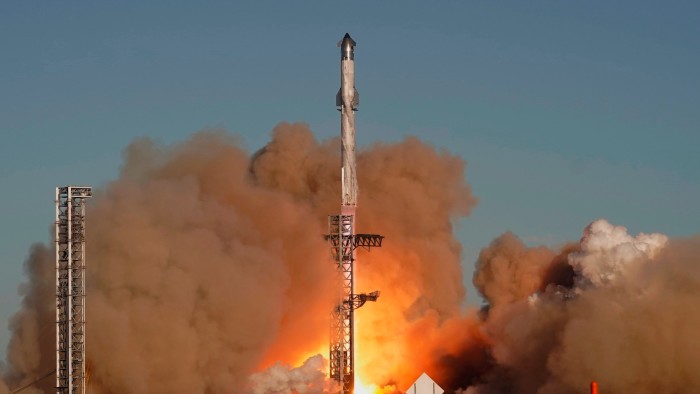Unlock the Editor’s Digest for free
Roula Khalaf, Editor of the FT, selects her favourite stories in this weekly newsletter.
A SpaceX Starship rocket has exploded after lift-off from Texas, in a setback for Elon Musk’s $350bn space technology company just hours after a successful launch by rival Blue Origin.
Starship experienced “a rapid unscheduled disassembly”, with initial data indicating a fire developed in the aft section, SpaceX said on Thursday.
However, the company did manage to execute a successful “catch” of the flight’s rocket booster on its return to Earth.
In a post on his social media platform X, Musk said the main rocket’s failure might have been due to an oxygen or fuel leak in the firewall of the ship’s engine.
“Nothing so far suggests pushing next launch past next month,” he said.
The flight was the seventh test launch of a Starship, a 400ft rocket powered by Raptor engines that first reached space in November 2023.
Videos posted on social media showed it spectacularly disintegrating in a shower of flames over the Turks and Caicos Islands in the Caribbean. SpaceX said the debris had fallen “into the Atlantic Ocean within the predefined hazard areas”.
The US Federal Aviation Administration was reported to have briefly slowed and diverted aircraft around the area where the debris was falling after issuing a warning to pilots. Flight-tracking websites noted commercial flights in the area diverting after the explosion.
SpaceX said the failure “served as a reminder that development testing by definition is unpredictable”.
The incident came shortly after the successful maiden launch of Blue Origin’s New Glenn rocket, backed by Amazon founder Jeff Bezos, who is challenging Musk in the satellite launch market. The launch of New Glenn came five years later than originally planned.
Earlier on Thursday, Bezos wished Musk and SpaceX luck in a post on X.
SpaceX became the world’s most valuable private start-up a month ago, receiving a $350bn valuation in an employee stock sale. That marked a significant jump from the company’s $210bn valuation just six months earlier.
Investors rushed to back SpaceX in part because of Musk’s proximity to the incoming president, according to people with knowledge of that deal, leading to a “Trump bump” in the valuation of various Musk entities.
SpaceX has led the race to commercialise space flight, making strides towards Musk’s ultimate ambition to develop reusable rockets and make the human race “multiplanetary”.
The company, founded in 2002, became the first private company to transport people to the International Space Station in 2020. Last year, SpaceX was called upon to return stranded astronauts from the station.
Source link









